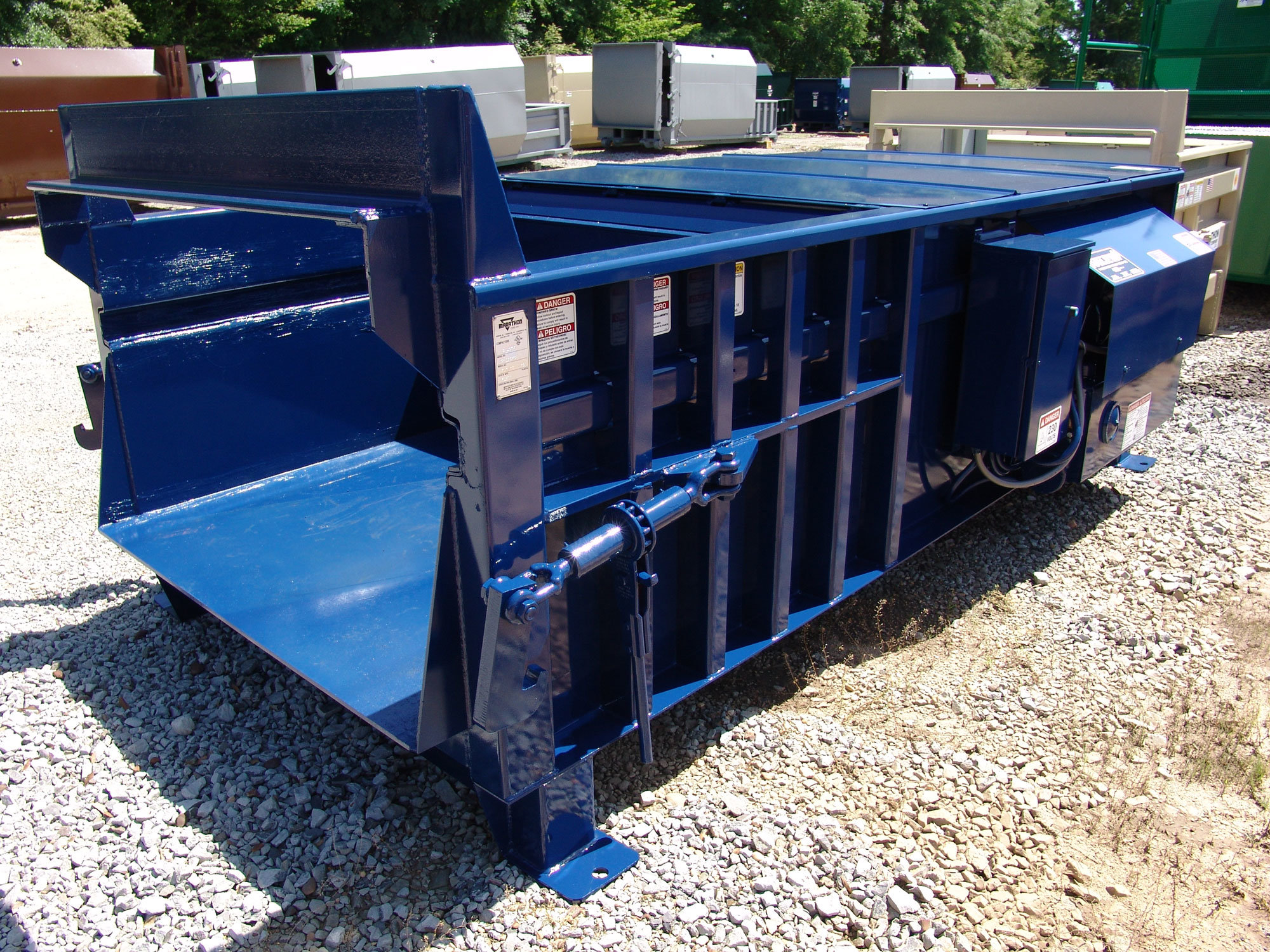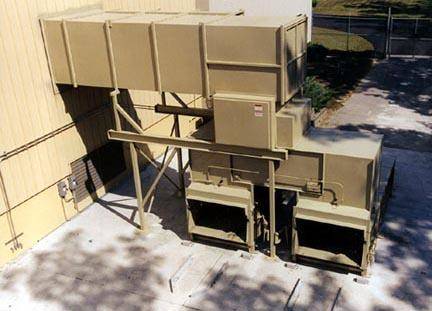The role of Commercial trash compactor equipment in environmentally friendly waste strategies
Recognizing the Various Usages of Waste Tools in the Recycling Industry
The reusing market relies greatly on specialized waste equipment to maximize handling and recuperation. Each device, from shredders to balers, serves a distinct objective that enhances general performance. Recognizing these duties is necessary for improving sustainability efforts. Commercial garbage compaction equipment. As modern technology advances, brand-new advancements arise, promising to change standard methods. This development elevates vital questions concerning the future of waste monitoring and its influence on environmental preservation. What adjustments lie ahead for this vital sector?
The Role of Shredders in Material Processing
Shredders play a critical role in the reusing industry by effectively refining different types of waste products. These makers are designed to minimize big items, such as plastics, metals, and natural waste, right into smaller, workable items. This size reduction is important for succeeding recycling processes, as it permits easier handling and sorting. Along with promoting recycling, shredders enhance safety and security by decreasing the risk of injury related to managing large waste items.
Additionally, shredders add to environmental sustainability by making sure that materials are processed in a means that takes full advantage of source healing. They can deal with a varied series of products, making them flexible tools in waste management centers. The effective procedure of shredders not only streamlines the reusing procedure but likewise raises the overall performance of waste diversion initiatives, advertising a circular economic climate. Their relevance in product processing can not be overstated, as they serve as a fundamental step in the direction of sustainable waste management practices.

Exactly How Balers Enhance Effectiveness in Waste Management
Balers greatly boost efficiency in waste management by condensing different materials right into bundles, which streamlines storage space and transport. By compressing recyclables such as cardboard, plastics, and steels, balers considerably minimize the volume of waste. This compression not just takes full advantage of space in recycling centers but also lessens the number of trips needed to transfer materials, causing reduced fuel costs and lowered environmental impact.
Furthermore, balers add to improved safety and security in waste administration procedures. Small bundles are simpler to deal with and pile, decreasing the risk of mishaps connected with loose materials. The consistent size of bales permits extra reliable loading and dumping processes, improving procedures within recycling centers. Furthermore, balers can improve the total quality of recyclables, as appropriately compressed materials are less most likely to be contaminated. On the whole, balers play a crucial function in maximizing waste administration practices, advertising sustainability in the recycling sector.
Conveyor Systems: Simplifying the Recycling Process
Including sophisticated machinery like balers greatly enhances waste monitoring procedures, yet the performance of the reusing process is even more enhanced via the use of conveyor systems. These systems play a necessary function in the seamless transport of products within reusing centers. By promoting the activity of various waste types, conveyor systems minimize manual handling and reduce the risk of contamination during the recycling process.
In addition, conveyor systems can be tailored to fit the one-of-a-kind designs and functional discover this info here requirements of recycling centers. Their ability to operate continuously permits for a constant flow of materials, improving performance and ensuring that sorting and refining devices receives a constant supply.
Geared up with features like adjustable rates and automated controls, conveyor systems can optimize the circulation of products, greatly boosting total effectiveness (Commercial garbage compaction equipment). As a result, these systems are important in modern recycling procedures, simplifying procedures and contributing to effective waste administration
Sorting Devices: The Secret to Product Recovery
Sorting devices are necessary parts in the reusing sector, substantially improving the efficiency of product recovery. These equipments play a critical duty in the separation of numerous recyclable materials, permitting a streamlined process that takes full advantage of resource extraction. By utilizing advanced modern technologies, such as optical sensors and air classifiers, sorting makers can identify and classify materials based upon their weight, make-up, and dimension. This ability guarantees that metals, plastics, and paper items are properly isolated, reducing contamination and boosting the quality of recycled outcome.
The procedure of arranging machines significantly minimizes the dependence on hand-operated labor, which can be both vulnerable and taxing to mistakes - Commercial garbage compaction equipment. Furthermore, the automation supplied by these devices speeds up the overall recycling procedure, resulting in greater throughput and raised operational effectiveness. As a result, sorting equipments are essential in achieving sustainable waste management goals, making it possible for the recycling sector to effectively recuperate valuable materials while lowering landfill dependence

Innovations in Waste Devices for a Sustainable Future
Recent developments in waste equipment are driving the reusing market toward an extra sustainable future. Innovations such as automated sorting systems, which make use of artificial knowledge and artificial intelligence, improve effectiveness by accurately determining and read what he said dividing recyclables. This leads to greater healing rates and minimized contamination. Additionally, advancements in compacting technology permit a lot more efficient transport of products, reducing carbon impacts throughout transit.
Additionally, innovations in shredding devices enhance the handling of intricate products, making it possible for the recycling of items that were as soon as considered non-recyclable. The combination of eco-friendly energy sources, like solar power, in waste processing facilities better adds to sustainability goals. Furthermore, advancements in waste-to-energy technologies and eco-friendly products are reshaping the landscape of waste monitoring. Jointly, these advancements signify a transformative shift within the recycling industry, promoting not only environmental management but additionally financial feasibility for future generations.
Often Asked Questions
What Types of Products Can Waste Devices Deal With?
The kinds of products waste tools can take care of consist of plastics, steels, paper, glass, and natural waste. Each devices kind is created for certain products, enhancing efficiency and efficiency in sorting and refining different waste streams.
Just How Typically Should Waste Equipment Be Kept?

Are There Safety Worry About Using Waste Tools?
Security concerns with utilizing waste equipment consist of prospective injuries from mechanical breakdowns, direct exposure to dangerous materials, and inadequate training. Appropriate upkeep, regular evaluations, and staff member education and learning are vital i loved this to mitigate these dangers successfully in any type of setup.
What Is the Ordinary Life-span of Recycling Devices?
The ordinary lifespan of reusing devices normally varies from 10 to twenty years, depending upon elements such as use strength, maintenance techniques, and technological advancements, which can significantly affect toughness and effectiveness in time.
How Is Waste Equipment Powered in Recycling Facilities?
Waste tools in reusing centers is commonly powered by electricity, though some machines might use different energy sources like gas or diesel. This power makes it possible for effective handling and transformation of products for reusing purposes.
Shredders play an important role in the reusing market by successfully refining different kinds of waste products. They can take care of a diverse array of materials, making them versatile devices in waste monitoring facilities. Balers considerably boost efficiency in waste management by condensing various materials into bales, which simplifies storage and transportation. The kinds of products waste devices can take care of consist of plastics, metals, paper, glass, and organic waste. Security problems with making use of waste tools include prospective injuries from mechanical malfunctions, exposure to hazardous products, and poor training.